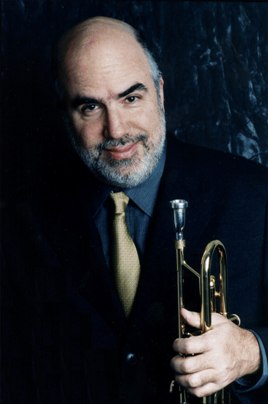
Interview by Joe Montague
 I
walked into the green room at the Triple Door in
I
walked into the green room at the Triple Door in
Brecker, who also plays the flugelhorn, has over the years recorded and
performed with some of the music industry’s greatest artists, including his late
brother Michael Brecker, a saxophonist whose influence helped shape the modern
day jazz scene. In 2006, the Brecker brothers teamed up one last time to record
the live album Some Skunk Funk Over the years, Randy Brecker has also appeared
on projects such as Blood Sweat & Tears’ first album,
Child Is Father to the Man, as well
as well as working with industry greats, Bruce Springsteen, Chaka Khan, George
Benson, Horace Silver, James Taylor, Art Blakey and numerous others.
“I
will be sixty-two next week, and when you get to this age, you have more of a
tendency to look back than forward, because looking too far forward, things
don’t look too good,” he says, as we share an uneasy laugh, and although ten
years his junior, I momentarily consider applying his comment to my own life.
He
continues, “You try to make the best of it, and when you get to sixty, it is a
hump (that you) have to get over. You realize that you have a large history to
look back on. I enjoy doing that, trying to dredge up old memories, and think of
old names. It depends where I am. (For instance),
In
January of 2007, the world lost a dear friend when Michael Brecker passed away
after a lengthy struggle with cancer that progressed into leukemia, but not
before the thirteen-time Grammy Award winner had recorded
Pilgrimage. Not knowing how sensitive
the wounds still might be, I sought and received Randy’s permission to ask some
questions about his relationship with Michael.
“It
is hard for me to relate to Mike as an iconic figure in jazz, because to me he
is still just my brother. It is hard for me to focus on how influential he was,
even though I obviously know that he was. Foremost, I think of him as my
brother. If I could get past that and look from afar like anyone else, I would
say that he has to be one of the most influential jazz musicians, other than
John Coltrane, because he had a real vision in mind, and he stuck to his
artistic vision. He was one of the few guys, and I think partly because he had a
big following, that was able to do musically pretty much whatever he wanted, and
people didn’t try to channel him into doing something else. He will occupy a
unique position in jazz history, and he certainly was one of the most popular
saxophonists ever, but he could back it up, because the music had so much
emotional depth,” says Brecker.
Brecker refers to his relationship with Michael as being unique and, “I think
that the only thing that I have, that is as strong as the love I have for my
brother, is the love of music Whenever I hear a saxophone player, the first
thing that I think of is my brother. We played together, for gee, from 1969,
until, it was a good thirty-five years off and on, and a lot of those years, we
were constantly playing together. He was directly involved in my development, as
I was with his development, and I think that people always think of me in terms
of him, and (to a lesser degree), of him in terms of
me.”
Brecker recalls, “We always looked forward to playing together, and the other
thing unique about the relationship was, that although we would spur each other
on creatively, there was no unhealthy competition. We were always pulling for
each other, and he was my biggest fan. That is something else that I miss, is
just having him around, so I can play something for him, because really he was
the reason that I wrote a lot of music, just so I could let him hear it. I have
to re-channel all those energies now.”
Randy Brecker has championed the flugelhorn since his college days, when he
first picked up the instrument. “(I play the flugelhorn) under certain
circumstances, ballads and in places where you want to express a broader
palette.
It lends itself more to
lyrical playing, rather than a lot of technical playing, because the range is
somewhat limited and you can only really play up to a high C, as the sound gets
a little thinner. You can’t really use the high register on a flugelhorn; you
have to think a little more melodically. It is usually used in softer
situations, where there is more communication. It has a very sensual sound.”